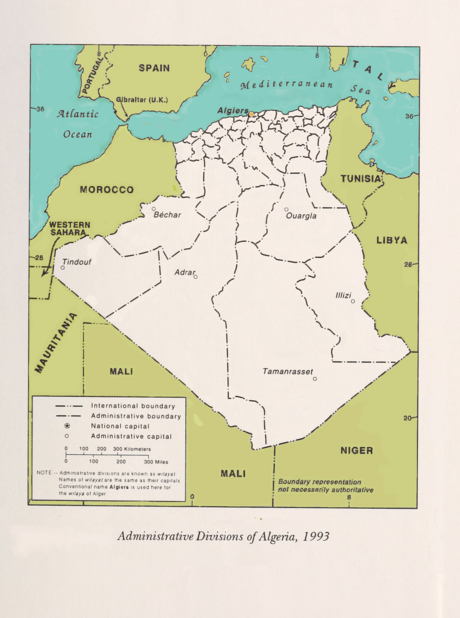People's Democratic Republic of Algeria: Difference between revisions
More languages
More actions
(map) |
No edit summary |
||
| Line 3: | Line 3: | ||
[[File:Algeria map.png|thumb|right|460px|Map of Algeria]] | [[File:Algeria map.png|thumb|right|460px|Map of Algeria]] | ||
Algeria is a member of the [[United Nations]], African Union, OPEC and the Arab League. It also contributed towards the creation of the Maghreb Union. | Algeria is a member of the [[United Nations]], African Union, OPEC and the Arab League. It also contributed towards the creation of the Maghreb Union. | ||
==History== | |||
France seized Algeirs from the Ottoman Empire in 1830 and over the next four decades established their control over the rest of Algeria, making it a French colony. In the 1950s and 60s the indigenous people of Algeria, under the leadership of the Front de libération nationale (FLN), struggled to free the country from French rule. Algeria achieved independence in 1962. Its first president was FLN leader [[Ahmed Ben Bella]]. In the 1960s and 70s, under Ben Bella and his successor Houari Boumédiène, Algeria pursued industrialisation within a state-controlled socialist economy. Agriculture and the oil wells were nationalised. | |||
Algeria was the home of Franz Fannon, the famous anti-colonial writer | |||
[[Category:Algeria| ]] | [[Category:Algeria| ]] | ||
[[Category:African countries]] | [[Category:African countries]] | ||
Revision as of 01:25, 4 March 2022
Algeria (Formal Arabic: الجزائر, al-Jazā’ir; Berber: Dzayer), officially the People's Democratic Republic of Algeria, is a country located in North Africa. It is the largest country on the Mediterranean sea, the second largest on the African continent and the eleventh-largest country in the world in terms of land area. It is bordered by Tunisia in the northeast, Libya in the east, Niger in the southeast, Mali and Mauritania in the southwest, a few kilometers of the Moroccan-controlled Western Sahara in the southwest, Morocco in the west and northwest, and the Mediterranean Sea in the north. Its size is almost 2,400,000 km2 with an estimated population near to 35,000,000. The capital of Algeria is Algiers.

Algeria is a member of the United Nations, African Union, OPEC and the Arab League. It also contributed towards the creation of the Maghreb Union.
History
France seized Algeirs from the Ottoman Empire in 1830 and over the next four decades established their control over the rest of Algeria, making it a French colony. In the 1950s and 60s the indigenous people of Algeria, under the leadership of the Front de libération nationale (FLN), struggled to free the country from French rule. Algeria achieved independence in 1962. Its first president was FLN leader Ahmed Ben Bella. In the 1960s and 70s, under Ben Bella and his successor Houari Boumédiène, Algeria pursued industrialisation within a state-controlled socialist economy. Agriculture and the oil wells were nationalised.
Algeria was the home of Franz Fannon, the famous anti-colonial writer
